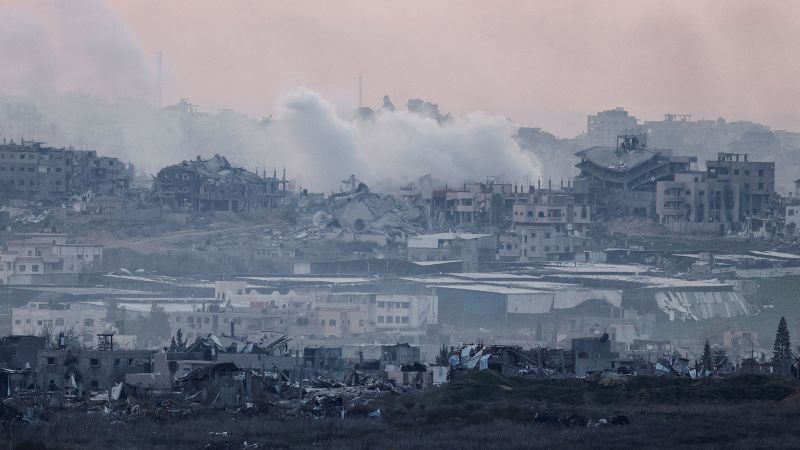14 Posts Sort By
Latest
Oldest
The director of the Independent Commission for Human Rights (ICHR) in Gaza has died after he was hit by an Israeli airstrike earlier this week, according to officials.
The Ministry of Health in Gaza and another rights group confirmed Raafat Salha’s death on Thursday morning.
According to the Al Mezan Center for Human Rights, 12 of Salha’s family members, including his wife and four children were also killed in the strike, which hit a home where they were sheltering in Deir al-Balah at 11:35 p.m. local time Tuesday. Salha sustained serious head injuries and was transferred to Al-Aqsa hospital where he died of his injuries.
“The Independent Commission for Human Rights holds the occupying power, Israel, fully responsible for this atrocity, which adds to a long series of crimes against civilians in Gaza,” the ICHR said in a statement posted Wednesday.
CNN has contacted the Israel Defense Forces (IDF) for comment.
Separately, at least 45 people were killed overnight by Israeli strikes on Gaza just hours after the ceasefire-hostage deal was agreed with Hamas on Wednesday.
Israel on Thursday morning delayed a cabinet vote on the Gaza ceasefire and hostage deal, blaming Hamas for reneging on parts of the agreement.
“Hamas reneges on parts of the agreement reached with the mediators and Israel in an effort to extort last minute concessions,” the Israeli Prime Minister’s Office said in a statement. “The Israeli cabinet will not convene until the mediators notify Israel that Hamas has accepted all elements of the agreement.”
Izzat al-Rishq, a member of Hamas’ political bureau, said in a statement on Telegram shortly afterward that Hamas “is committed to the ceasefire agreement that was announced by the mediators.”
The Israeli cabinet was expected to meet Thursday to vote on the highly anticipated ceasefire and hostage release deal that was agreed between Hamas and Israel on Wednesday.

A volley of Israeli attacks on Gaza City killed at least 45 people, just hours after Israel and Hamas reached a ceasefire accord, according to the Gaza Civil Defense.
At least 20 people were killed in a strike on a residential block near the coastal neighborhood of Sheikh Radwan early Wednesday, the agency said. In a separate attack on a nearby residential block, 15 people were killed and up to 20 injured, according to the Civil Defense.
Video footage from the scene shows rescuers trying to cut people free from blankets under the weight of a building reduced to rubble. Bodies are visible in the clip. In another video, rescuers take injured children for treatment, and minors can be seen receiving care on gurneys after the attack.
In the Al-Rimal neighborhood, the Civil Defense reported five people were killed and 10 injured after a home collapsed under Israeli bombing. And in the central Al-Daraj quarter, five people were killed after a residential block was bombed, according to the agency.
Dozens of casualties were taken to the Al-Ahli Baptist Hospital complex in Gaza City, its director Dr. Fadel Naim said, adding that the next 70 hours before the ceasefire comes into effect would be “violent and painful for the people of Gaza. The attacks on Gaza have not stopped.”
“Despite the recent announcement of an agreement to end the war, the aggression continues,” Naim said. “Following the announcement, the occupation carried out intense bombings on residential areas in Gaza City in what seems to be a desperate attempt to cause as much harm as possible.”
CNN has reached out to the Israel Defense Forces for comment on Wednesday night’s attacks on Gaza City.
The first phase of the deal reached between Hamas and Israel on Wednesday includes a pause in the war and the release of Israeli hostages held in Gaza and of Palestinian prisoners held in Israeli custody.
Several details and the timeline of the full deal remain unclear. But here’s what we know so far about the hostages held in Gaza, and who may be released.
- First phase: Hamas and its allied militant groups will release 33 hostages in the first phase, including civilians and female soldiers, children, the elderly and the sick.
- Still in Gaza: Hamas and its allies hold 94 of 250 people taken from Israel on October 7, 2023. Of those, at least 34 are dead, according to the Israeli government, though the true number is expected to be higher. Eighty-one of the hostages are men and 13 are women. Hamas holds an additional four hostages held captive since 2014, at least two of whom are dead.
- Foreign nationals: Eighty-four hostages in Gaza are from Israel, while eight are from Thailand, one is from Nepal, and one is from Tanzania.
- Americans: Seven American hostages are being held in Gaza. The three Americans presumed to be alive are Edan Alexander, Sagui Dekel-Chen and Keith Siegel; four others have been declared dead and their remains have yet to be returned.
- Who will be released: Siegel and Dekel-Chen are on the list of hostages to be released in the first phase, according to a senior US official and two other sources. Three female Israeli civilian hostages are expected to be released on the first day of the ceasefire, and on the seventh day, Hamas is set to release four more, according to a document shared by a senior Hamas official. Following that, “Hamas will release three Israeli detainees every seven days, starting with women (civilians and soldiers),” the document stated.
- Hostage and prisoner exchange: According to the document, Israel will release 1,000 Palestinian prisoners who were arrested on October 8, 2023, but were not involved in Hamas’ attack on Israel the day before. Of the 33 hostages Hamas is expected to release, nine who are ill and injured will be exchanged for 110 Palestinian prisoners with life sentences, according to the document.
- Palestinian prisoners: Israel holds at least 10,000 Palestinian prisoners, according to the Commission of Detainees Affairs and the Palestinian Prisoners’ Society – though that number does not include an unknown number of Palestinians taken captive in Gaza.
- Administrative detention: The figure of Palestinian prisoners held by Israel includes 3,376 people held under administrative detention, meaning they have had no public charges against them nor faced trial, including 95 children and 22 women.
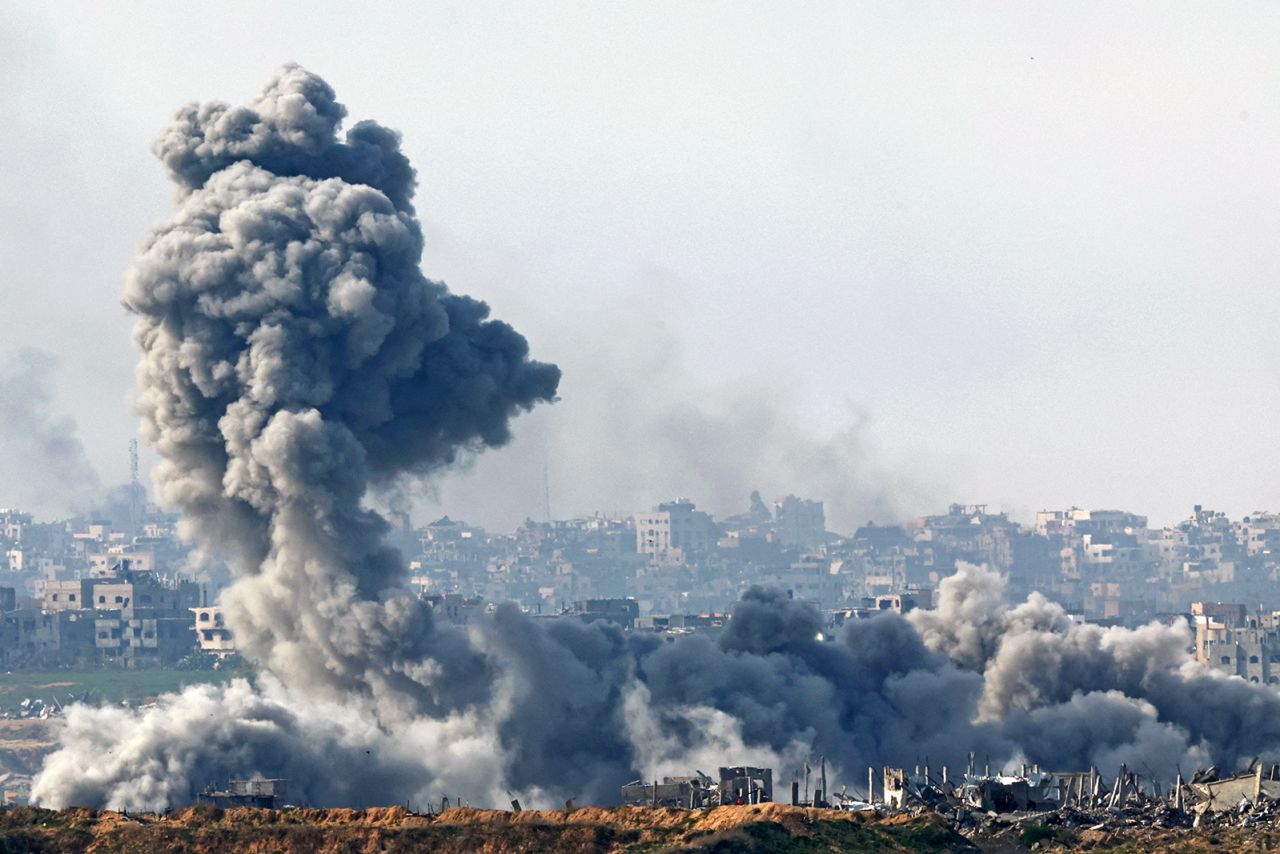
Israel’s 15-month war in Gaza, launched in response to Hamas’ October 7 attack, has decimated large swathes of the enclave and destroyed key health care infrastructure while placing an enormous strain on hospitals that remain functional.
Overnight, the death toll in the strip climbed higher, even as mediators announced a ceasefire and hostage deal set to take effect Sunday.
At least 12 people were killed and 20 others injured in an Israeli strike on a residential area in northern Gaza Wednesday, according to the Gaza Civil Defense.
More than 46,000 people have been killed in Gaza during the war, according to the Palestinian Ministry of Health. Nearly 18,000 of those killed were children, the ministry says.
But the true number is likely much higher, according to a recent study.
Research by the London School of Hygiene and Tropical Medicine (LSHTM) published in The Lancet journal, said there were an estimated 64,260 “traumatic injury deaths” in Gaza between October 7, 2023 and June 30, 2024. The Palestinian Ministry of Health in Gaza put the figure at 37,877 at the time.
As of October 2024, the number of Gazans killed by violence was thought to exceed 70,000, the study said, based on the estimated underreporting rate.
The total death toll attributable to Israel’s military campaign is likely to be higher still, it said, as its analysis does not account for deaths caused by disruption to health care, insufficient food, clean water and sanitation, and disease.
World leaders backed the ceasefire and hostage deal agreed by Israel and Hamas as people celebrated in cities around the world, including Berlin, Tunis, Tunisia and Jordan’s capital Amman.
UN Secretary-General Antonio Guterres said the agreement was “a critical first step” and called on all parties to uphold commitments and fully enforce the deal, adding that the UN was ready to support its implementation.
European Commission President Ursula Von Der Leyen said she “warmly welcomed” the agreement, while the EU high representative for foreign affairs Kaja Kallas, said, “this is a major, positive breakthrough toward ending the violence.”
Here’s a roundup of some of the international reaction:
- Turkey: The Foreign Ministry said Turkey “will continue to support the Palestinian people in the period ahead,” and “peace negotiations must commence immediately to establish an independent, sovereign, and contiguous State of Palestine.”
- Lebanon: Caretaker Prime Minister Najib Mikati said on X that the deal “ends a bloody chapter in the history of the Palestinian people, who have endured immense suffering due to Israeli aggression.” He also expressed hope for a sustainable ceasefire, “paving the way for a final resolution to the Palestinian issue and granting the Palestinian people their legitimate rights.”
- Australia: Prime Minister Anthony Albanese said the deal “ is a constructive step towards peace and stability in the region.” His statement added that “our thoughts are with all the civilians killed, displaced and taken hostage in this conflict, and the many humanitarian workers who lost their lives in the service of others.”
- Japan: Chief Cabinet Secretary Yoshimasa Hayashi said the deal “marks a significant step toward alleviating the humanitarian crisis and stabilizing the situation —objectives Japan has consistently supported.” Japan will “actively contribute to international efforts aimed at improving the humanitarian situation, fostering reconstruction, and supporting governance in Gaza.”
- South Africa: South Africa “welcomes the ceasefire” and “calls for the implementation of a just and lasting peace that ensures the human rights of both Palestinians and Israelis are protected and promoted,” the government said in a statement. The ceasefire “must lay the basis for a just peace which should include the establishment of a contiguous, independent, and viable Palestinian state,” it added.
International aid agencies are calling for an urgent and major scaling up of humanitarian access to Gaza, following Israel and Hamas’s agreement to a ceasefire-hostage deal.
Many welcomed the deal and vowed to scale up their work in the Palestinian enclave, where 15 months of constant Israeli bombardment and restrictions on aid have caused a catastrophic humanitarian crisis.
Here’s what some of the aid groups are saying:
- UNRWA: The main humanitarian aid group in Gaza called for “rapid, unhindered and uninterrupted humanitarian access and supplies to respond to the tremendous suffering caused by this war.” Some 2 million people rely on the agency for aid, with 1 million people using UNRWA shelters for food and health care amid the fighting in the enclave.
- UNICEF: The UN children’s fund said the deal was “long overdue.” At least 14,500 children have been killed and the war has left “17,000 unaccompanied or separated from their parents,” it said. The group called on both parties to allow the “necessary level of aid into Gaza” so that it could “increase the screening and treatment of children suffering from malnutrition” and “facilitate vaccination catch-up for 420,000 children under 5 years.”
- World Food Programme: The WFP said it has enough food along the borders and on its way to Gaza to feed over a million people for three months, but it needs urgent funds. To be able to scale up and distribute the aid, it also “needs all border crossings open and functioning reliably. We also need humanitarian teams to be able to move freely and safely across Gaza to reach those in need.”
- Red Cross: The International Committee of the Red Cross (ICRC) said it is prepared to help implement the deal. The group helped to facilitate the release of 109 hostages along with 154 Palestinian detainees in 2023, and said these operations “are highly complex and require meticulous logistical and security planning to minimize the risk to life.” The ICRC said it is “prepared to massively scale up our humanitarian response in Gaza” and warned the immense humanitarian needs will “take months, if not years” to address.
- Norwegian Refugee Council: The NRC called on Israel to immediately lift all restrictions on aid and aid agencies “to avert famine-like conditions and ensure access to shelter, food, and medical care for all in need.” The NRC drew attention to the mass destruction in Gaza and the need to repair and rebuild homes, schools, hospitals and other civilian infrastructure. The group said its teams on the ground stand ready to “scale up our efforts, helping families begin the long process of rebuilding their lives.”
- International Rescue Committee: IRC president David Miliband said a ceasefire was “beyond urgent.” He told CNN, “There needs to be a massive scale-up of the aid flows – that’s medicines, that’s non-food items, that is food, that is water, the basics of life and the fuel to get those goods around the Gaza Strip.” He said conditions need to be safer for aid workers to do their work and for civilians to receive aid and medical care.
The Israeli cabinet is expected to vote Thursday on whether to ratify a highly anticipated ceasefire and hostage release deal agreed between Hamas and Israel.
The agreement, expected go into effect Sunday, would deliver the first reprieve from war for the people of Gaza in more than a year, and only the second since the Israeli bombardment began 15 months ago.
Families of hostages expressed joy and relief following the announcement of the deal, which would initially see 33 hostages held in Gaza released in exchange for hundreds of prisoners held by Israel.
Here’s what to know:
- The deal: The first phase of the three-phase deal includes a 42-day ceasefire, a withdrawal of Israeli troops, a swap of hostages – including civilians and female soldiers, children, the elderly and the sick – and prisoners, and an influx of humanitarian aid into Gaza. US hostages held in Gaza will be released in the first phase. But many of the deal’s details and the timeline remain unclear.
- Israeli vote: The agreement still needs approval from Israel’s security cabinet, and then the government will need to pass it by a simple majority vote, a senior Israeli source told CNN. At least one member of Prime Minister Benjamin Netanyahu’s cabinet, Finance Minister Bezalel Smotrich, has indicated he will not vote for the deal as it stands. Netanyahu said he won’t comment on the deal until details are finalized.
- Urgent aid access: International aid agencies welcomed the deal and vowed to scale up their work in Gaza. The US said it hopes to send more than 500 aid trucks a day into the enclave during the ceasefire. The main humanitarian aid group in Gaza, UNRWA, called for “rapid, unhindered and uninterrupted humanitarian access and supplies to respond to the tremendous suffering caused by this war.”
- What Hamas says: Hamas said reaching an agreement on the Gaza ceasefire and hostage deal marks “a crucial turning point” in its “struggle against the enemy.” In a statement, Hamas said, “The agreement to stop the aggression against Gaza is an achievement for our people, our resistance, our nation, and the free people of the world.”
- Trump and Biden: The agreement was brokered with an “almost unprecedented” level of cooperation between the Biden and Trump camps, a senior US official said. However, after the agreement was announced, both the incoming and outgoing president took full credit – a sign the poisonous relationship between them endures.
- Deal implementation: The United States, Egypt, and Qatar have pledged to fully implement all three phases of the deal. The mediators said they will work jointly “to help ensure that all three of its stages will be fully implemented by both parties.” Qatar’s prime minister told CNN the mediating countries will handle a “follow-up mechanism” to ensure no parties violate the ceasefire.
- Israeli bombing: A wave of Israeli strikes hit Gaza on Wednesday as the deal was being agreed. At least 12 people were killed and 20 injured when an Israeli strike hit a residential area in Gaza City, the Gaza civil defense said. Israeli strikes also hit Nuseirat, central Gaza, and the southern Khan Younis area, killing at least 11 people, according to hospital officials and the Gaza civil defense.
- Chance to end the war: The second and third phases of the ceasefire still have to be negotiated during the first phase. Those talks would begin on the 16th day of the implementation of the deal, according to an Israeli official. US President Joe Biden said the talks will go beyond the temporary ceasefire announced Wednesday and include a release of further hostages, the beginning of Gaza’s rebuild, and “a permanent end of the war.”
European leaders have expressed hope that the first phase of the deal reached between Hamas and Israel on Wednesday could lead to prolonged peace.
German Chancellor Olaf Scholz said the deal “must now be implemented to the letter,” adding: “This ceasefire opens the door to a permanent end to the war and to the improvement of the poor humanitarian situation in Gaza.”
British Prime Minister Keir Starmer welcomed the “long-overdue news” of the deal, and called for “a huge surge in humanitarian aid” to the battered enclave.
“After months of devastating bloodshed and countless lives lost, this is the long-overdue news that the Israeli and Palestinian people have desperately been waiting for,” Starmer said in a statement, adding that the international community’s attention should now turn to securing a “permanently better future for the Israeli and Palestinian people, grounded in a two-state solution.”
Starmer hailed the release of hostages who are expected to return home as part of Wednesday’s deal, who were “ripped from their homes on that day and held captive in unimaginable conditions ever since,” while paying tribute to those who will not make it home, “including the British people who were murdered by Hamas.”
As news of the ceasefire deal emerged, French President Emmanuel Macron said in an X post: “The agreement must be respected. The hostages, freed. The Gazans, rescued. A political solution must be found.”
Qatar’s prime minister announced that Israel and Hamas agreed to a ceasefire on Wednesday, leading to a pause in fighting and a phased release of Israeli hostages and Palestinian prisoners. Here are some photos of reactions in the region.
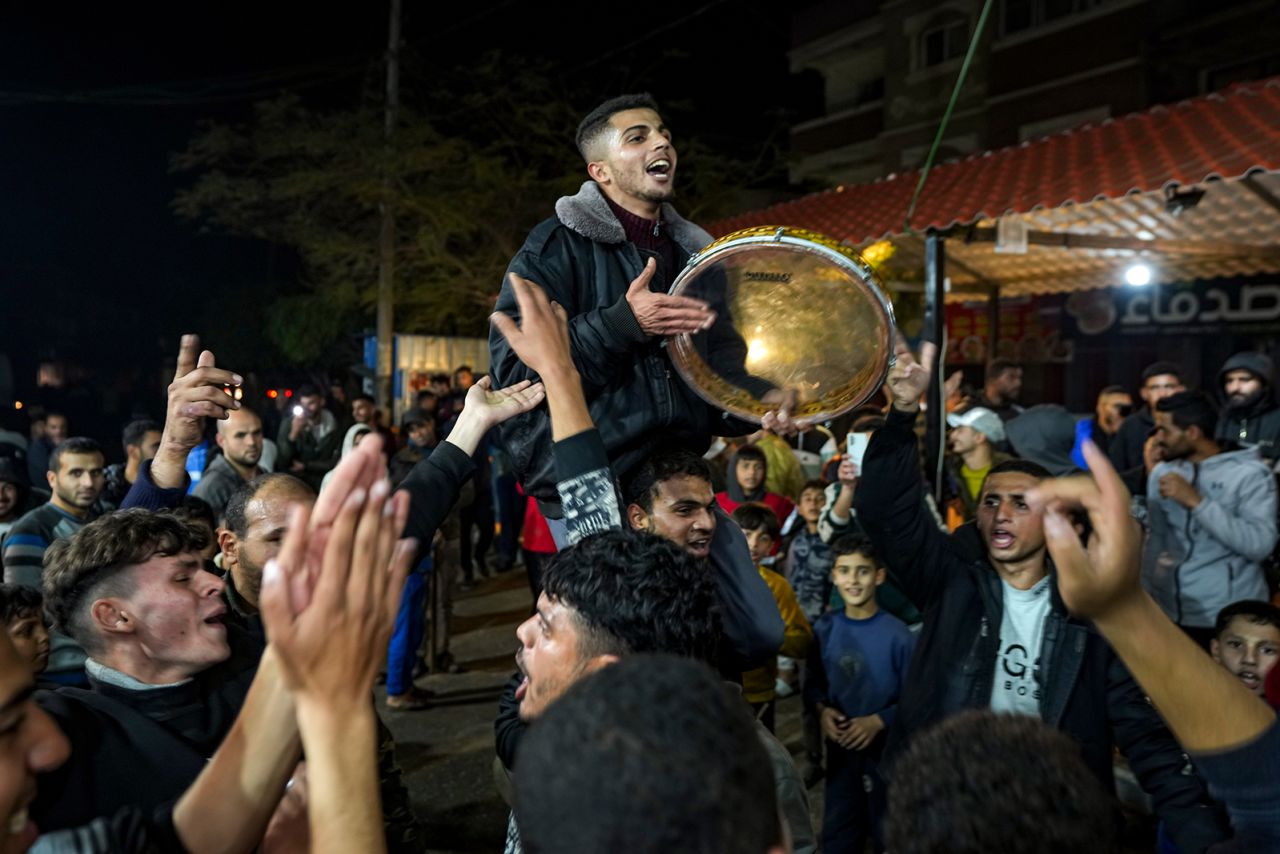
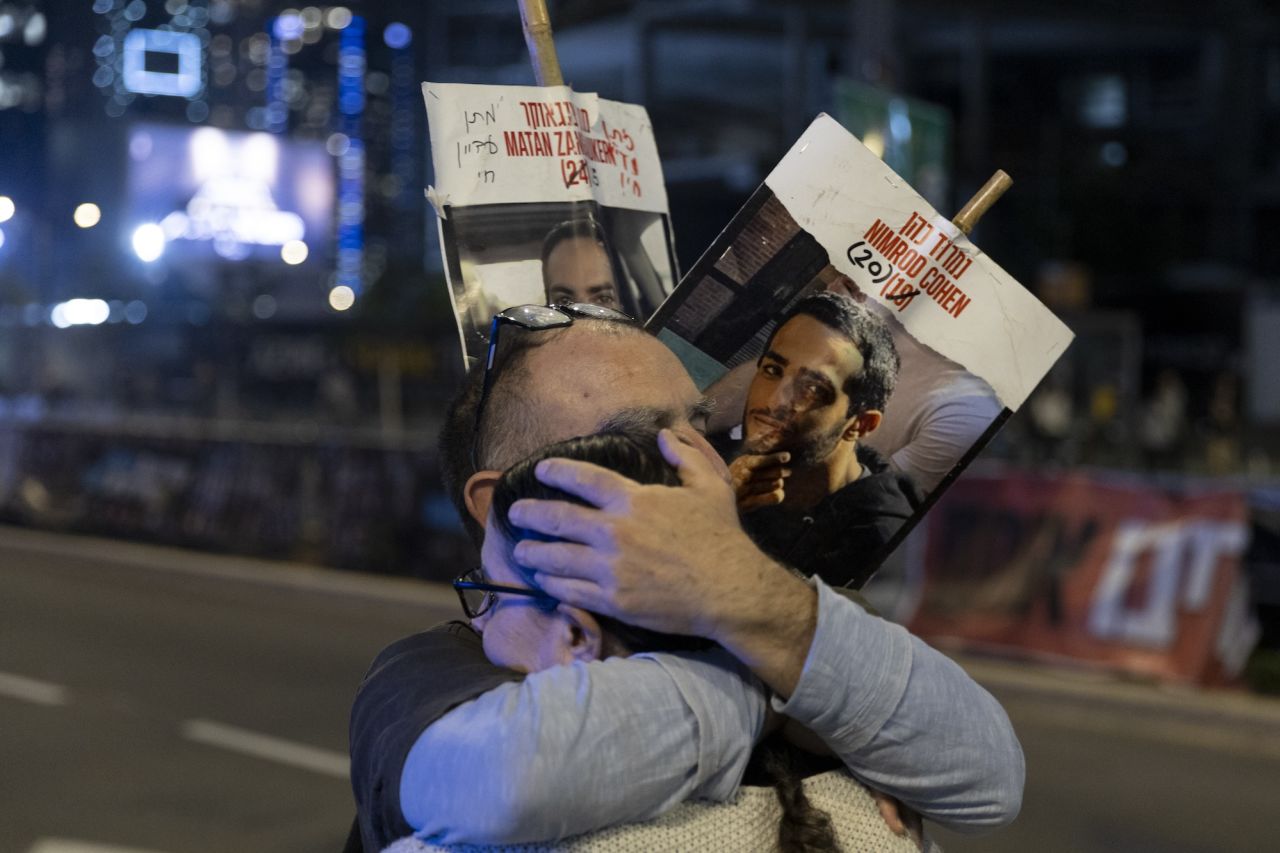
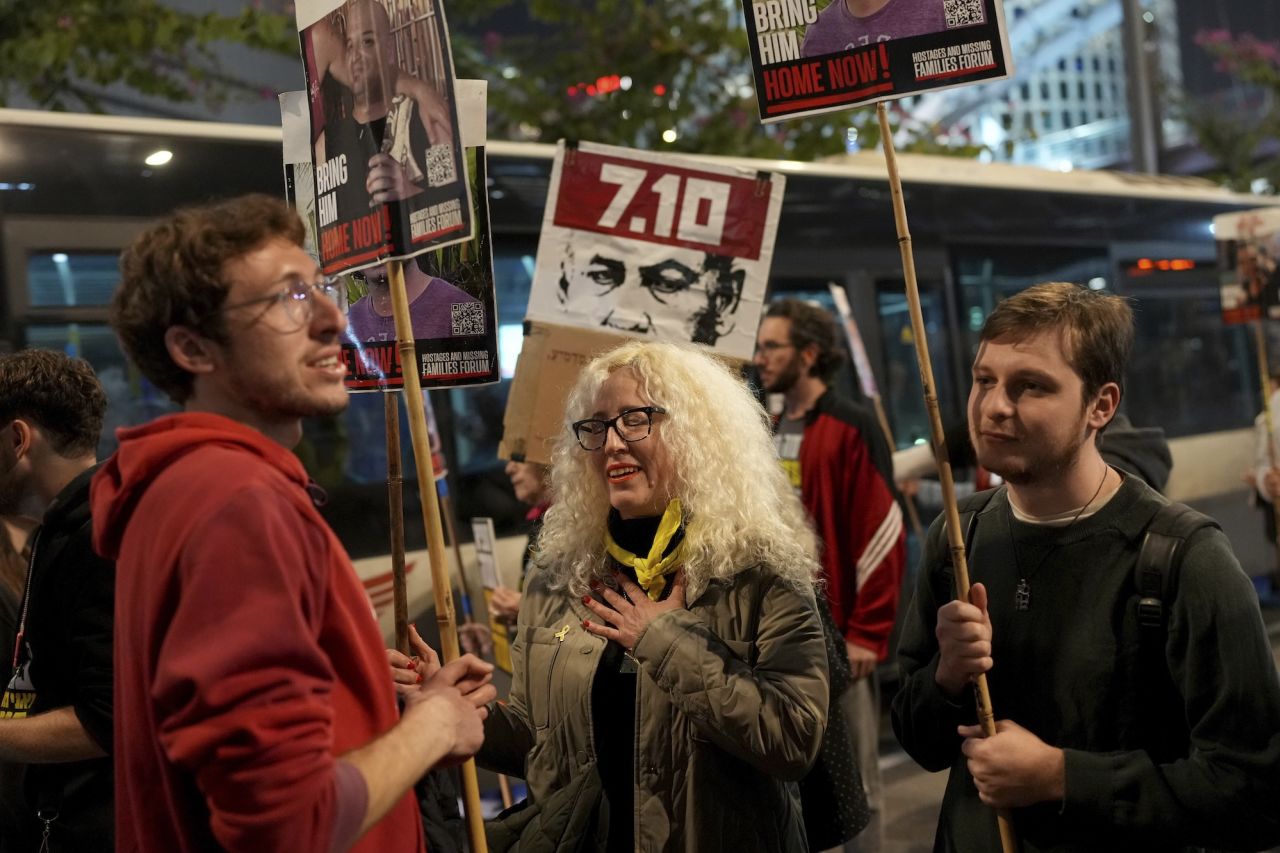
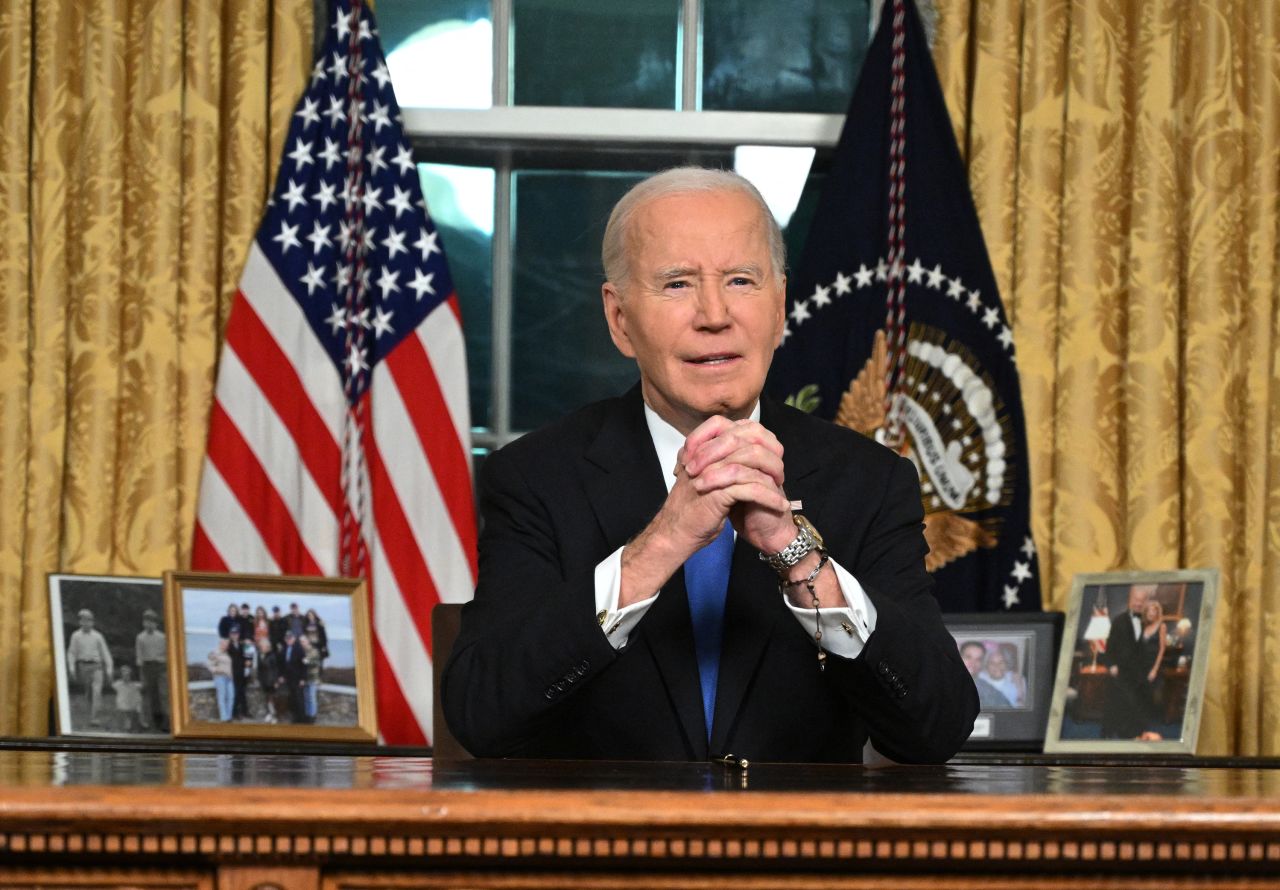
The first phase of the deal reached between Hamas and Israel on Wednesday includes a pause in the war and the release of Israeli hostages held in Gaza and of Palestinian prisoners held in Israeli custody.
But several details and the timeline of the full deal remain unclear and will be key to its success moving forward.
The deal is set up to progress in three distinct phases:
Phase one is expected to start Sunday and last for six weeks. This phase will feature a ceasefire, a withdrawal of Israeli troops, a swap of hostages and prisoners, and an influx of humanitarian aid into Gaza. US hostages held in Gaza will be released in that first phase, US President Joe Biden said on Wednesday.
The second and third phases are less developed, and the details will be decided during the first phase, Qatari Prime Minister Mohammed bin Abdulrahman Al Thani said in a briefing Wednesday.
“We will continue to do everything we can, everything possible together with our partners, to ensure that this deal is implemented as it’s agreed,” he said. “And this deal will bring us peace, hopefully, at the end of it. I believe that it all depends on the parties of the agreement acting in good faith in that agreement in order to ensure that no collapse happens to that deal.”
The father of Israeli hostage Nimrod Cohen says he sees a long fight ahead before his son is released, despite the announcement of a ceasefire-for-hostages deal.
Yehuda Cohen says he doesn’t anticipate his 20-year-old son, a soldier with the Israel Defense Forces, will be among those returned in the first phase of the deal.
The first phase is expected to see the release of 33 hostages, including civilians and female soldiers, children, the elderly and the sick in exchange for an undisclosed number of Palestinian prisoners, Qatari Prime Minister Mohammed bin Abdulrahman Al Thani said on Wednesday.
“We’re going to start counting days in two tracks. One track is the process of hostages being released. The second track is to count 16 days from the beginning” of the deal, when the second phase is expected to be negotiated, Cohen said.
The Cohen family expects a long period of “fighting” and keeping “the pressure” on the government of Israeli Prime Minister Benjamin Netanyahu to keep the deal on track, he added.
“We’re talking about reality. Things won’t happen because they happen. Things happen because people make sure they are happening,” he said. “I’m not hoping. I’m fighting for it. If I just sit down and hope or pray, it won’t happen.”
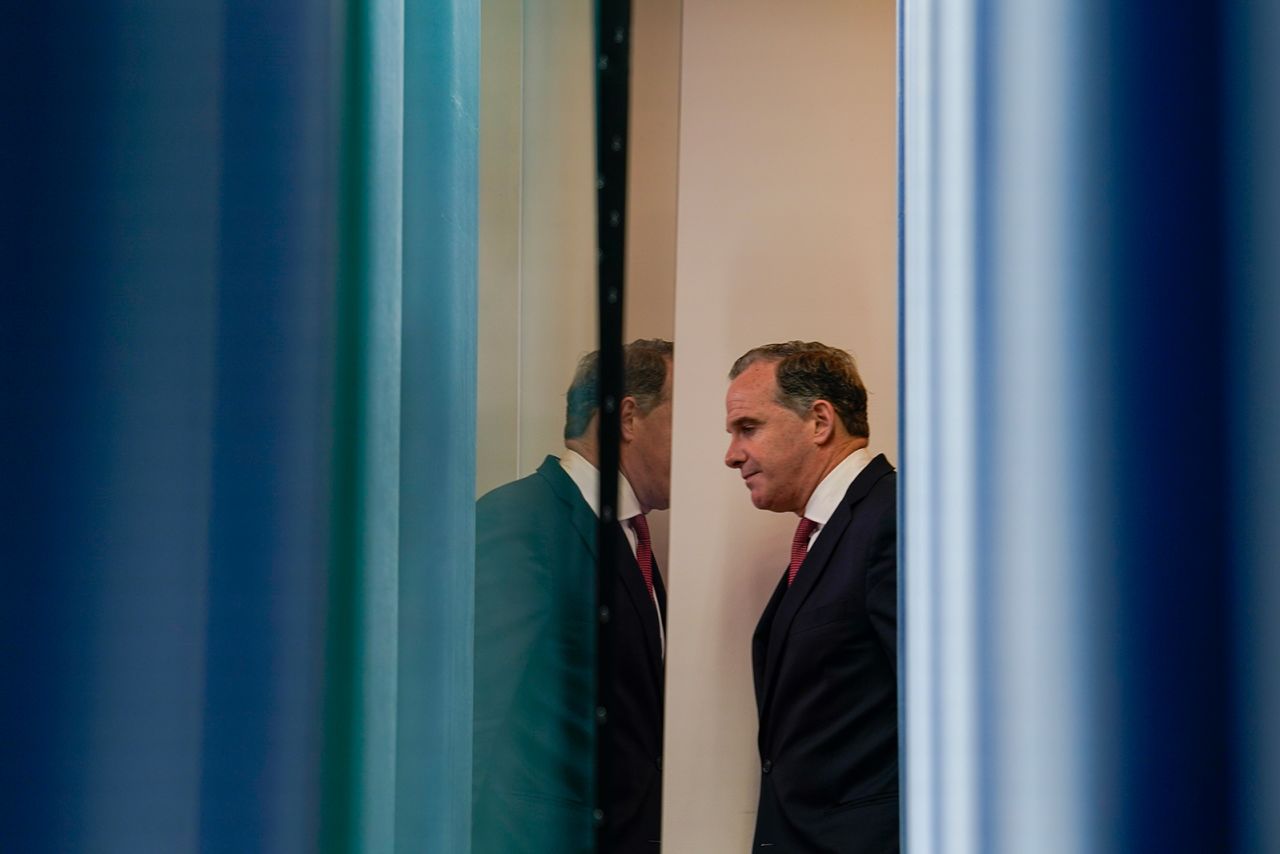
When Qatar’s prime minister emerged Wednesday to declare — at long last — that a ceasefire-for-hostage deal had been struck in Gaza, representatives for two American administrations were on hand in Doha to bask in the victory.
The cooperation between the two was “almost unprecedented,” a senior Biden administration official said after the deal was clinched, made possible by a rare intersection of interests between bitter rivals who both saw an opening following Trump’s victory.
Brett McGurk, the longtime Middle East negotiator for President Joe Biden, had been planted in the Qatari capital for weeks in the hopes of a final agreement. He was joined in recent days by President-elect Donald Trump’s Middle East envoy, Steve Witkoff, for the final push.
At points, McGurk and Witkoff divvied up meetings across the Middle East to push the deal across the line, including critical talks between Witkoff and Israeli Prime Minister Benjamin Netanyahu last week that McGurk joined by phone. If McGurk was focused primarily on the parameters of the deal, Witkoff was on hand to emphasize Trump’s desire to see a deal finished by Inauguration Day.
After the agreement was announced, both the incoming and outgoing president took full credit, a sign the poisonous relationship between them endures.
Ultimately, however, the deal enables both Biden and Trump to claim victory. It notches a final bit of positive news for a president who is poised to leave office with the lowest approval rating of his term. And it bolsters the bonafides of a president-elect who vowed “all hell would break out” in Gaza if the hostages were not released before his second inauguration.
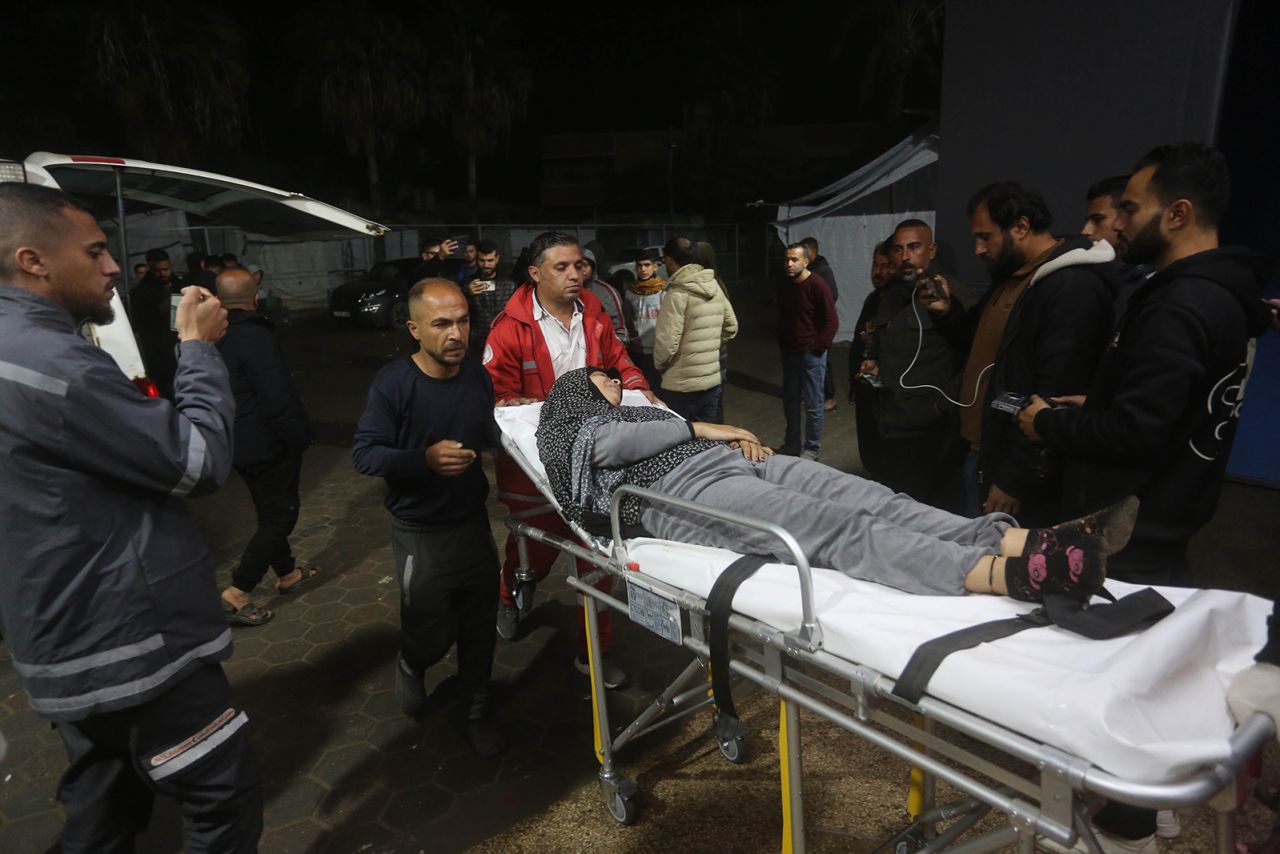
An Israeli strike that hit a residential area in northern Gaza killed at least 12 people and injured 20 others on Wednesday, according to the Gaza Civil Defense.
The statement came shortly after the announcement of the ceasefire-for-hostages deal, which is expected to come into effect on January 19.
The strike hit “a residential block consisting of multiple houses in the vicinity of Sheikh Radwan,” a neighborhood of Gaza City, the civil defense said.
CNN has reached out to the Israel Defense Forces for comment.
